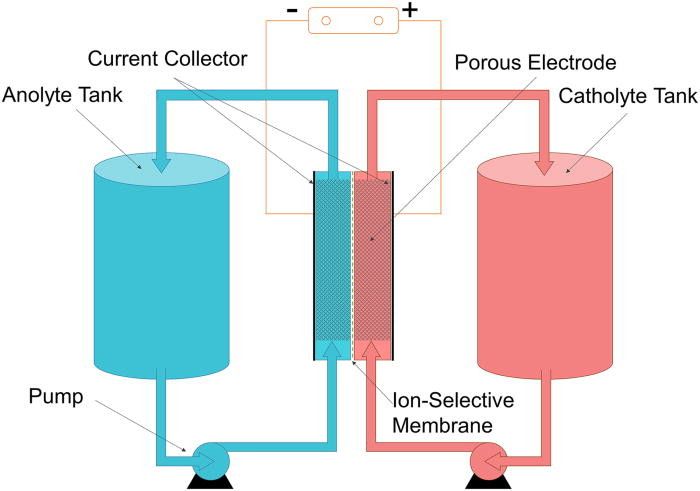Flow Batteries - The Future of Energy Storage?
In recent years, flow batteries have emerged as a promising alternative to mainstream battery chemistry for energy storage applications. With their unique design and benefits, flow batteries are gaining attention as a viable solution for large-scale energy storage needs. In this article, we'll explore what flow batteries are, how they work, and why they offer a compelling alternative to traditional battery technologies.
What are flow batteries? #
Flow batteries belong to a class of rechargeable batteries that store energy in liquid electrolytes contained in external tanks. Unlike conventional batteries where energy is stored in solid electrodes, flow batteries utilize liquid electrolytes that flow through the battery cell during charging and discharging processes. This distinctive design allows for independent scaling of power and energy capacity, making flow batteries highly suitable for applications requiring long-duration energy storage.
How do flow batteries work? #
Flow batteries consist of two electrolyte solutions stored in separate tanks – one positive and one negative – which are pumped into the battery cell when energy is needed. When charging the battery, energy is used to pump the electrolytes into the cell. The electrolytes pass through a membrane, also known as an ion exchange membrane, which allows the flow of ions while preventing the mixing of the two electrolyte solutions.
During discharge, the electrolytes flow in reverse, generating electricity through the electrochemical reactions at the electrodes. The energy is released as the ions from the positive and negative electrolytes react, passing through the ion exchange membrane. The charged electrolytes can be continuously circulated within the system, making flow batteries ideal for applications requiring long-duration discharge and frequent cycling.

Advantages of flow batteries #
Flow batteries offer several advantages that make them an attractive alternative to mainstream battery chemistry:
Scalability #
Flow batteries provide independent scalability of power and energy capacity by adjusting the size of the electrolyte storage tanks. This flexibility allows for customization based on specific energy storage needs, making them suitable for a wide range of applications, from residential and commercial to grid-scale storage.
Long Cycle Life #
Flow batteries are known for their excellent cycling capabilities. Unlike traditional batteries, flow batteries can undergo thousands of charge-discharge cycles without significant degradation. This extended cycle life reduces the need for frequent battery replacements, resulting in lower costs and improved overall system longevity.
Deep Discharge Capability #
Flow batteries can be discharged completely without affecting their performance or lifespan. This deep discharge capability makes them ideal for applications requiring sustained power output over an extended period, such as renewable energy integration, load shifting, or backup power during grid outages.
Safety #
Flow batteries utilize non-flammable electrolytes, which enhances their safety compared to some conventional battery chemistries. The separation of the electrolytes in external tanks further minimizes the risk of thermal runaway or catastrophic failure, ensuring a higher level of safety in energy storage systems.
Environmental Friendliness #
Flow batteries often employ environmentally friendly electrolyte materials, such as vanadium or organic compounds. These materials are non-toxic and can be easily recycled, reducing the environmental impact associated with battery manufacturing and disposal.
Applications of flow batteries #
Flow batteries have a wide range of applications, including:
Grid-scale energy storage #
Flow batteries can be deployed in utility-scale energy storage systems to store excess renewable energy generated during periods of high production and release it during peak demand, improving grid stability and reliability.
Renewable energy integration #
Flow batteries enable the efficient integration of intermittent renewable energy sources, such as solar and wind power, by storing excess energy and providing a consistent power output when renewable generation is low.
Commercial and industrial energy management #
Flow batteries offer a cost-effective solution for commercial and industrial facilities to manage energy consumption, reduce peak demand charges, and provide backup power during outages.
The Future of flow batteries #
While flow batteries are still evolving and gaining traction, ongoing research and development efforts aim to enhance their efficiency, reduce costs, and improve overall performance. With advancements in materials, electrode design, and system optimization, flow batteries hold tremendous potential for becoming a mainstream energy storage technology in the future.
As the demand for large-scale, long-duration energy storage solutions continues to grow, flow batteries offer an exciting alternative to traditional battery chemistry. Their scalability, long cycle life, safety features, and environmental friendliness make them an attractive option for a variety of applications. As the energy landscape evolves, flow batteries are poised to play a significant role in enabling a more sustainable and reliable energy future.
In conclusion, flow batteries represent a remarkable advancement in energy storage technology. With their unique design, scalability, and numerous benefits, they offer a compelling alternative to mainstream battery chemistry. As research and development efforts progress, we can expect to see flow batteries playing an increasingly important role in the transition to a cleaner and more efficient energy system.